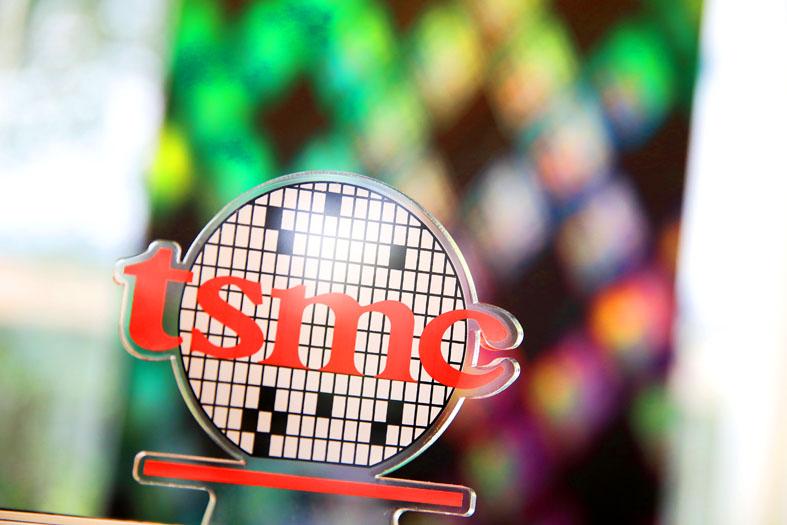The construction of a wafer fab in Japan to be run by a joint venture led by Taiwan Semiconductor Manufacturing Co (TSMC, 台積電) is to begin today.
Japan Advanced Semiconductor Manufacturing Inc (JASM), the joint venture, said that it signed an agreement with authorities in Kikuyo-machi in Japan’s Kumamoto Prefecture on Tuesday, with company president Yuichi Horita announcing the schedule for the new plant’s construction.
The plant is expected to begin shipping products in December 2024, Horita said.

Photo: Cheng I-Hwa, Bloomberg
In November last year, TSMC, the world’s largest contract chipmaker, said it would spend up to US$2.12 billion in equity investment on the wafer fab to establish a TSMC-majority-owned subsidiary to provide foundry services, with Sony Semiconductor Solutions Corp (SSS) taking a less than 20 percent stake in the new company.
In February, Japan’s Denso Corp said it would take an at least a 10 percent stake in the joint venture.
The plant would cover 72,000m2 and feature office buildings in addition to production lines, JASM said.
The company would move its headquarters from Kumamoto City to Kikuyo-machi once construction is completed, it said.
The plant would employ 1,700 people, including about 230 TSMC employees to be sent from Taiwan and about 200 from Sony Group Corp, which owns SSS, JASM said, adding that it would recruit about 1,200 workers.
TSMC dispatched the first group of 10 technology professionals from Taiwan last month, JASM said.

‘SWASTICAR’: Tesla CEO Elon Musk’s close association with Donald Trump has prompted opponents to brand him a ‘Nazi’ and resulted in a dramatic drop in sales Demonstrators descended on Tesla Inc dealerships across the US, and in Europe and Canada on Saturday to protest company chief Elon Musk, who has amassed extraordinary power as a top adviser to US President Donald Trump. Waving signs with messages such as “Musk is stealing our money” and “Reclaim our country,” the protests largely took place peacefully following fiery episodes of vandalism on Tesla vehicles, dealerships and other facilities in recent weeks that US officials have denounced as terrorism. Hundreds rallied on Saturday outside the Tesla dealership in Manhattan. Some blasted Musk, the world’s richest man, while others demanded the shuttering of his

ADVERSARIES: The new list includes 11 entities in China and one in Taiwan, which is a local branch of Chinese cloud computing firm Inspur Group The US added dozens of entities to a trade blacklist on Tuesday, the US Department of Commerce said, in part to disrupt Beijing’s artificial intelligence (AI) and advanced computing capabilities. The action affects 80 entities from countries including China, the United Arab Emirates and Iran, with the commerce department citing their “activities contrary to US national security and foreign policy.” Those added to the “entity list” are restricted from obtaining US items and technologies without government authorization. “We will not allow adversaries to exploit American technology to bolster their own militaries and threaten American lives,” US Secretary of Commerce Howard Lutnick said. The entities

Minister of Finance Chuang Tsui-yun (莊翠雲) yesterday told lawmakers that she “would not speculate,” but a “response plan” has been prepared in case Taiwan is targeted by US President Donald Trump’s reciprocal tariffs, which are to be announced on Wednesday next week. The Trump administration, including US Secretary of the Treasury Scott Bessent, has said that much of the proposed reciprocal tariffs would focus on the 15 countries that have the highest trade surpluses with the US. Bessent has referred to those countries as the “dirty 15,” but has not named them. Last year, Taiwan’s US$73.9 billion trade surplus with the US

Taiwan’s official purchasing managers’ index (PMI) last month rose 0.2 percentage points to 54.2, in a second consecutive month of expansion, thanks to front-loading demand intended to avoid potential US tariff hikes, the Chung-Hua Institution for Economic Research (CIER, 中華經濟研究院) said yesterday. While short-term demand appeared robust, uncertainties rose due to US President Donald Trump’s unpredictable trade policy, CIER president Lien Hsien-ming (連賢明) told a news conference in Taipei. Taiwan’s economy this year would be characterized by high-level fluctuations and the volatility would be wilder than most expect, Lien said Demand for electronics, particularly semiconductors, continues to benefit from US technology giants’ effort